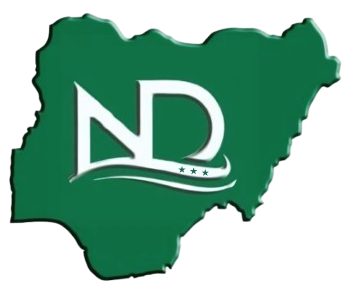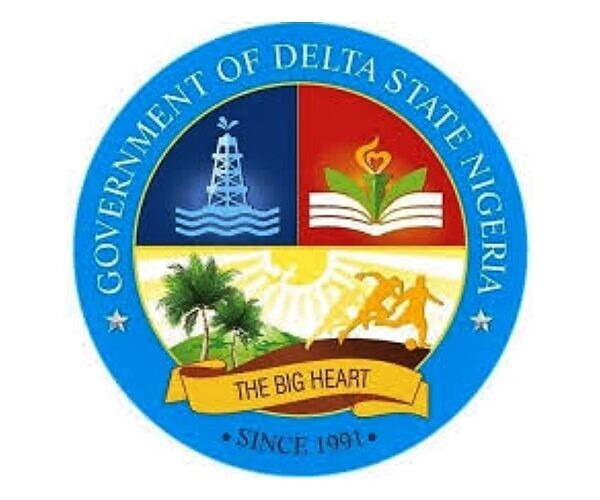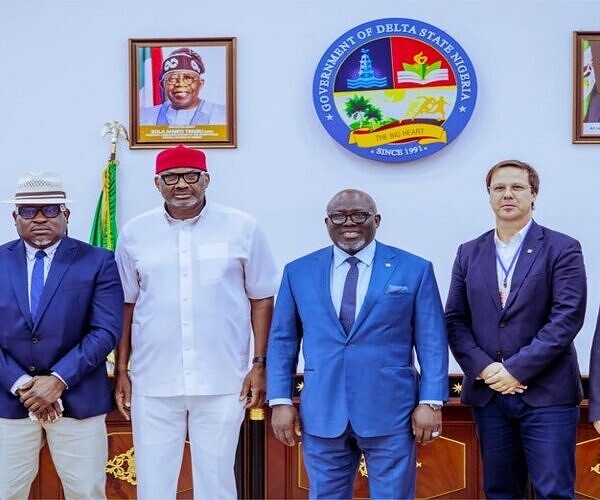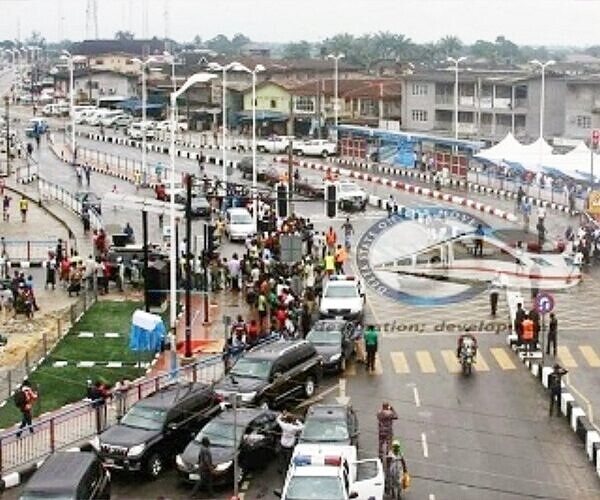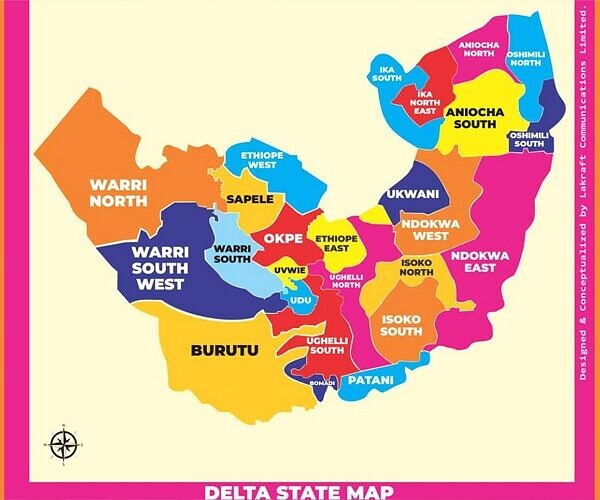- Government Organisation
- Profile
- Delta, Nigeria
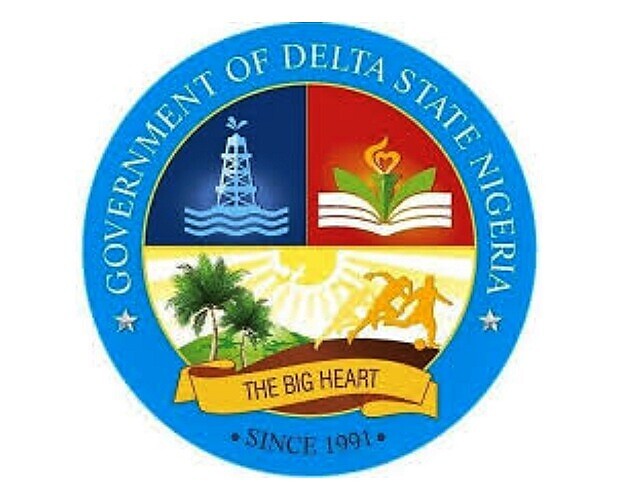
Delta State
Introduction
Delta State, referred to as “THE BIG HEART”, is located in the South-South geopolitical zone of Nigeria, is named after the Niger Delta, a significant portion of which lies within the state. Formed from the former Bendel State on 27 August 1991, Delta is bordered by Edo State to the north, Anambra and Rivers States to the east, Bayelsa State to the south, and the Bight of Benin to the west, which stretches across approximately 160 kilometers of the state’s coastline.
Initially created with 12 local government areas in 1991, the state now comprises 25 local government areas. Its capital is Asaba, situated along the River Niger in the northeastern part of the state, while Warri, on the southwestern coastline, serves as its economic hub.
Delta State is the 23rd largest in area among Nigeria’s 36 states and ranks as the 12th most populous, with an estimated population of over 5.6 million as of 2016. Geographically, the state is characterized by the Central African mangroves in the coastal southwest and Nigerian lowland forests across most of its territory.
A small portion of the Niger Delta swamp forests is also located in the far south. The River Niger and its distributary, the Forçados River, define Delta’s eastern and southern borders, respectively, while the Escravos River flows through Warri.
The coastal areas are interwoven with numerous smaller Niger distributaries, forming a significant part of the western Niger Delta. The state’s natural environment is home to diverse wildlife, including threatened species such as the dwarf crocodile, grey parrot, African fish eagle, mona monkey, and African manatee, along with potentially extirpated populations of the African leopard and Nigeria-Cameroon chimpanzee.
Offshore, Delta’s waters are rich in biodiversity, with species like the Lesser African threadfin, crabs, blue mussels, and various cetaceans.
Historical Background
Delta State was carved out of the former Bendel State on August 27, 1991, in response to longstanding demands by the people of the old Delta Province for a distinct state. This movement was accompanied by another proposal for the creation of “Anioma State,” which aimed to encompass the Asaba and Agbor Divisions of the old Midwest region.
When the then Military President, General Ibrahim Babangida, established Delta State, he designated Asaba—an important town within the Northwestern Lower Niger—as the capital. The chosen site for the capital was relatively undeveloped, strategically located at the heart of the two divisions that make up the Northwestern Lower Niger.
Before its creation, Delta State was part of the Mid-Western State from 1963 to 1976, and later, it became part of Bendel State from 1976 to 1991. The name “Bendel” was a blend of “Benin” and “Delta,” reflecting the integration of the Benin and Delta provinces within the Western Region.
Historically, Delta State has been inhabited for centuries by various ethnic groups, including the Isoko and Urhobo in the center, Ukwuani in the east, Ika, Enuani, and Olukumi in the northeast, Anioma in the northwest, and the Ijaw, Itsekiri, and Urhobo in the southwest. Before colonial rule, the area now known as Delta State was divided into several monarchial states, such as the Kingdom of Warri and Agbor Kingdom. In 1884, the region became part of the British Oil Rivers Protectorate.
By the early 1900s, the area was incorporated into the Southern Nigeria Protectorate, which later became part of British Nigeria. However, it wasn’t until the 1910s that colonial forces gained permanent control over the region, following the resistance of the Ekumeku Movement. Notably, Delta State includes one of the few areas in Nigeria that experienced French control, as the British leased the enclave of Forcados to France from 1903 to 1930.
Following Nigeria’s independence in 1960, the area now comprising Delta State was initially part of the Western Region until it was split in 1963, forming the Mid-Western Region. During the Nigerian Civil War in 1967, the Igbo-majority Eastern Region attempted to secede as the state of Biafra and briefly occupied the Mid-Western Region, including Delta, declaring it the Republic of Benin.
This occupation was marked by significant hostilities between Biafran forces and the predominantly non-Igbo inhabitants of Delta State, with atrocities committed on both sides, including the Biafran-perpetrated attacks against ethnic Hausa, Urhobo, and Ijaw people, and the Nigerian forces’ Asaba massacre against ethnic Igbos in Asaba.
After the war, the Mid-Western Region was reestablished and later renamed Bendel State in 1976. In 1991, Bendel State was divided, creating Edo State in the north and Delta State in the south.
Delta State’s economy is primarily driven by the production of crude oil and natural gas, making it one of Nigeria’s leading oil-producing states. Agriculture also plays a significant role, with substantial production of oil palm, yams, and cassava, alongside fishing and heliciculture.
Due to its considerable oil revenues, Delta State boasts the fourth highest Human Development Index in the country. However, longstanding disputes between oil companies and local communities, coupled with systemic corruption, have often led to tensions, particularly over the lack of development in the state’s host communities.
Geography
Delta State spans approximately 18,050 km² (6,970 sq mi), with over 60% of this area consisting of land. The state is situated in Nigeria’s Midwest region, lying between latitudes 5°00′ and 6°30′ N and longitudes 5°00′ and 6°45′ E. It shares borders with Edo State to the north and west for about 350 km (218 miles), Anambra and Rivers States to the east for about 93 km and 50 km respectively, and Bayelsa State to the southeast across the Niger River for 17 km and the Forçados River for 198 km.
The southern edge of the state is lined by the Bight of Benin, which extends along 160 kilometers of the state’s coastline. The terrain of Delta State is generally flat, without any significant hills. The state’s coastal belt is characterized by a network of rivulets and streams that are part of the Niger Delta.
Climate
A defining characteristic of Delta State’s climate is its susceptibility to flooding. The ecological landscape is shaped by heavy rainfall, making the state part of the lowland rainforest, freshwater swamp, and mangrove swamp regions of the Niger Delta. The average annual rainfall is 36.9 mm, with significant variations that have notable impacts on the environment.
For instance, in 2015, increased rainfall led to widespread flooding of farmlands, marking the year with the highest recorded rainfall at 3,183.6 mm. In contrast, 2007 saw the lowest rainfall over an 11-year period, with an annual total of 2,030.58 mm. Rainfall is minimal in January, while July experiences peak levels, reaching up to 423.2 mm.
Politics
Delta State is governed by an elected governor who collaborates with members of the state’s House of Assembly to administer the state’s affairs.
Electoral System
The electoral system in Delta State, as in other Nigerian states, operates on a modified two-round system. To win in the first round, a candidate must secure a plurality of the votes and at least 25% of the votes in at least two-thirds of the state’s local government areas.
If no candidate meets this threshold, a second round of voting is conducted between the candidate with the highest number of votes and the runner-up who garnered a plurality of votes in the largest number of local government areas.
Delta State Government: An Overview
Delta State, strategically located in the South-South geopolitical zone of Nigeria, operates under a democratic system characterized by the separation of powers among three branches: the Executive, the Legislative, and the Judiciary. These branches collaborate to ensure effective governance, development, and the overall welfare of the state’s residents across its 25 local government areas.
Executive Branch
The Executive branch is the driving force behind the administration of Delta State, led by the Governor, who is the chief executive officer and chief security officer of the state. The Governor is elected through a democratic process for a four-year term and may serve a maximum of two terms if re-elected. Supporting the Governor is the Deputy Governor, who plays a crucial role in the execution of state policies and the coordination of various government programs.
The Executive branch also includes the State Executive Council, composed of Commissioners who head various ministries such as Education, Health, Agriculture, and Works. These Commissioners are appointed by the Governor and are responsible for implementing government policies within their respective ministries.
Key areas of focus for the Executive branch include:
- Education: Improving the quality of education through infrastructure development, teacher training, and student welfare programs.
- Healthcare: Expanding access to healthcare services, including the Delta State Health Insurance Scheme, which aims to make healthcare affordable and accessible to all residents.
- Infrastructure: Enhancing road networks, transportation systems, and public utilities to foster economic growth and improve living standards.
- Security: Implementing measures to ensure the safety and security of all residents, including the support of law enforcement agencies and community policing initiatives.
- Agriculture: Promoting agricultural development as a means of diversifying the state’s economy, with a focus on boosting the production of key crops like oil palm, cassava, and yam.
Legislative Branch
The Legislative branch of Delta State is embodied by the Delta State House of Assembly, a unicameral body responsible for law-making, budget approval, and oversight of the Executive branch. The House of Assembly is composed of elected representatives from each of the 25 constituencies within the state. These representatives are charged with the responsibility of enacting laws that reflect the needs and aspirations of their constituents.
The House of Assembly is led by the Speaker, who presides over legislative sessions, ensuring that debates are conducted in an orderly manner and that the legislative process is followed. The Speaker also plays a pivotal role in mediating between the Executive and Legislative branches, fostering cooperation and ensuring that government policies align with the legal framework.
Delta State is further divided into three senatorial districts: Delta North, Delta Central, and Delta South. Each district elects a senator to represent their interests at the national level in the Nigerian Senate. Additionally, the state sends multiple representatives to the Federal House of Representatives, ensuring that Delta’s voice is heard in the formulation of national policies.
The legislative process in Delta State is designed to be inclusive, with public hearings and consultations allowing citizens to contribute to the law-making process. This ensures that the laws passed by the Assembly are not only reflective of the government’s agenda but also of the people’s needs.
Judicial Branch
The Judicial branch in Delta State operates as an independent entity, crucial for upholding the rule of law and delivering justice. It is headed by the Chief Judge, who oversees the functioning of the state’s courts, which include the High Court, Magistrate Courts, and Customary Courts. The judiciary’s independence is vital for maintaining checks and balances within the government, ensuring that the Executive and Legislative branches operate within the bounds of the law.
The courts in Delta State are responsible for interpreting laws, adjudicating disputes, and safeguarding the rights of citizens. They handle a wide range of cases, from civil and criminal matters to customary disputes. The judiciary also plays a key role in election petitions, resolving disputes that arise from the electoral process and ensuring that justice is served in accordance with the law.
The judicial system in Delta State is committed to accessibility, ensuring that justice is not only done but is seen to be done. Efforts have been made to modernize the court system, improve the efficiency of case management, and ensure that the judiciary is equipped to handle the complexities of modern governance.
Demographics
Delta State is a diverse region predominantly inhabited by several ethnic groups, including the Urhobo, Anioma, Isoko, Uvwie, Okpe, Ijaw, Ukwuani, Ika, Enuani, Igbo, Itsekiri, and Olukumi people. The presence of other ethnic groups in the state is minimal.
The Urhobo-Isoko people, who share a close cultural and linguistic heritage, form the largest ethnic group in Delta State, with a population of approximately 3.3 million spread across 13 local government areas. They are followed by the Ukwuani, Ika, and Aniocha-Oshimili (Igboid/Igbo) communities, collectively referred to as the Anioma people. This group numbers around 1.8 million and spans across nine local government areas.
The Itsekiri people, whose language is closely related to Yoruba, have been culturally influenced by the neighboring Edo people, as well as the Urhobo and Ijaw communities. The Okpe people, who speak a dialect of the Urhobo language, reside in two local government areas: Sapele and Okpe in Delta Central.
The Ijaws in Delta State are related to the predominant Ijaw population of neighboring Bayelsa State. Meanwhile, the Olukumi people are experiencing cultural and linguistic decline due to acculturation and assimilation.
The vast majority of Delta State’s inhabitants are Christian, with only a small fraction practicing traditional religions.
Administration
The executive, legislative, and judicial branches of the state government are headquartered in Asaba, with an additional government house annex located in Warri.
Past & Present Administrations
- Sheriff Oborevwori: 29 May 2023 to present (PDP)
- Ifeanyi Okowa: 29 May 2015 to 29 May 2023 (PDP)
- Emmanuel Uduaghan: 29 May 2007 to 29 May 2015 (PDP)
- James Ibori: 29 May 1999 to 29 May 2007 (PDP)
- Walter Feghabo: 12 August 1998 to 29 May 1999 (Military)
- John Dungs: 22 August 1996 to 12 August 1998 (Military)
- Ibrahim Kefas: 26 September 1994 to 22 August 1996 (Military)
- Bassey Asuquo: 10 December 1993 to 26 September 1994 (Military)
- Abdulkadir Shehu: 17 November 1993 to 10 December 1993 (Military)
- Luke Chijiuba Ochulor: 28 August 1991 to January 1992 (Military)
- Felix Ibru: January 1992 to November 1993 (SDP)
This lineage of governance reflects Delta State’s political evolution from military rule to the establishment of democratic leadership, predominantly under the PDP since Nigeria’s return to democracy in 1999.
Economy of Delta State
Delta State is one of Nigeria’s wealthiest and most economically developed states, with a strong economy driven by its abundant natural resources. The state has a relatively low incidence of extreme poverty, with around 3% of the population living in such conditions, compared to the national average of 31%, according to World Bank data from 2018. This economic stability is largely due to the state’s vast natural resources, particularly in the oil and gas sector.
Natural Resources
Delta State is rich in both solid minerals and hydrocarbons, making it a critical player in Nigeria’s overall economy.
- Solid Minerals Delta State is endowed with a variety of solid mineral resources, including industrial clay, silica, lignite, kaolin, tar sand, decorative rocks, and limestone. These minerals are essential raw materials for various industries, including:
- Brick Making: Industrial clay and silica are used in producing bricks, an essential construction material.
- Ceramics and Glass Manufacturing: Kaolin and silica are key components in ceramics and glass production, used in items ranging from household goods to industrial insulators.
- Decorative Stone Cutting and Quarrying: Decorative rocks and limestone are utilized in the construction and landscaping industries for decorative stones and building materials.
- Chemical Production: Various minerals serve as raw materials in the production of chemicals, insulators, and sanitary wares.
Despite the abundance of these solid minerals, they remain largely under-utilized, representing a significant untapped potential for further economic diversification and industrial development in the state.
- Crude Oil and Gas Delta State is one of Nigeria’s largest producers of crude oil, playing a pivotal role in the country’s petroleum industry. The state’s economy is predominantly driven by the extraction, refining, and sale of petroleum products. The oil and gas sector is the primary source of revenue, attracting significant investment from multinational oil companies and contributing substantially to both the state and national economies.The petroleum industry has also led to the development of related infrastructure and industries, including refineries, petrochemical plants, and export terminals. However, the reliance on oil has also brought challenges, such as environmental degradation and the need for economic diversification to ensure long-term sustainability.
Economic Development and Challenges
While Delta State enjoys a robust economy due to its natural resources, there are ongoing efforts to diversify its economic base and reduce dependence on oil. The state government has been focusing on developing other sectors such as agriculture, manufacturing, and tourism to create more jobs and sustainable growth.
Key areas of economic development include:
- Agriculture: Promoting the cultivation of crops like oil palm, cassava, and rubber, as well as fishing and aquaculture, which have significant potential for both local consumption and export.
- Industrialization: Encouraging investment in manufacturing industries that can process locally sourced raw materials, thus adding value and creating employment.
- Tourism: Leveraging the state’s cultural heritage and natural attractions to develop the tourism sector, which could become a significant revenue earner.
Delta State’s economy is one of the most dynamic in Nigeria, underpinned by its wealth of natural resources, particularly in the oil and gas sector. While the state is relatively affluent, ongoing efforts to diversify its economy and fully utilize its solid mineral resources are crucial for sustaining long-term economic growth and reducing the risks associated with over-dependence on petroleum revenues.
Higher Education in Delta State
Delta State boasts a diverse array of higher education institutions, providing a broad spectrum of academic and vocational training across various fields. These institutions cater to a wide range of disciplines, from engineering and petroleum studies to education and maritime technology. Here’s an overview of the higher education landscape in Delta State:
Federal and State Universities
- Federal University of Petroleum Resources, Effurun: Specializes in petroleum engineering and related fields, reflecting the state’s significant role in the oil industry.
- Delta State University, Abraka: Offers a comprehensive range of undergraduate and postgraduate programs across multiple disciplines.
- Delta State University of Science and Technology, Ozoro: Focuses on technological and scientific education to drive innovation and industrial development.
- Dennis Osadebe University, Anwai: Provides diverse academic programs, emphasizing research and community development.
- University of Delta, Agbor: A new institution aimed at offering quality education and addressing local and regional educational needs.
Polytechnics and Technical Institutes
- Delta State Polytechnic, Oghara: Offers a variety of technical and vocational programs designed to equip students with practical skills for the workforce.
- Delta State Polytechnic, Ogwashi-Uku: Provides technical education in fields such as engineering, business, and applied sciences.
- The Film and Broadcast Academy, Ozoro: Focuses on media, film production, and broadcasting, reflecting the growing importance of the creative industries.
- Petroleum Training Institute, Effurun: Specializes in training for the petroleum and energy sectors, providing industry-relevant skills and knowledge.
Colleges of Education and Health
- College of Education, Warri: Offers programs in teacher education and training, preparing educators for various educational settings.
- Federal College of Education (Technical), Asaba: Provides technical education and vocational training for future educators in technical fields.
- College of Education, Mosogar: Focuses on teacher training and educational development.
- Delta State College of Health Technology, Ofuoma, Ughelli: Provides specialized training in health-related fields.
- School of Nursing (Agbor and Warri): Offers nursing education and training in two key locations.
- Baptist School of Nursing, Eku: Provides nursing education within a religious framework.
Private and Specialized Institutions
- Michael and Cecilia Ibru University, Ughelli: A private institution offering diverse academic programs and a commitment to academic excellence.
- Western Delta University, Oghara: Provides quality education across various fields of study.
- Novena University, Ogume-Amai: A private university focused on providing high-quality education in several disciplines.
- Delta State School of Marine Technology, Burutu: Specializes in marine technology and maritime studies.
- Nigeria Maritime University, Okerenkoko, Warri South West: Dedicated to maritime education and research.
- Conarina School of Maritime & Transport Technology, Oria-Abraka: Focuses on maritime and transport technology training.
- University of Information and Communication Technology, Agbor: Offers programs in ICT and related fields.
Additional Institutions
- National Open University of Nigeria: With study centers in Asaba, Emevor, and Owhrode, it provides flexible learning opportunities for distance education.
- State School of Midwifery, Asaba: Specializes in midwifery training and education.
- Edwin Clark University, Kiagbodo: Offers a range of undergraduate and postgraduate programs.
- Eagle Heights University, Omadino, Warri: A private institution providing diverse academic programs.
- Admiralty University of Nigeria: Located in Ibusa and Sapele, it focuses on maritime and security studies.
- Adam Igbudu Christian Institute, Emevor: A private institution named after the founder of the Anglican Adam Preaching Society, offering Christian-based education.
Tourist Attractions in Delta State
Delta State, rich in history and culture, is home to numerous tourist attractions that draw visitors from around the world. These sites offer a glimpse into the state’s cultural heritage, historical significance, and natural beauty. Here are some of the most notable tourist attractions in Delta State:
1. Nana’s Palace
Nana’s Palace in Koko, Warri North Local Government Area, is a historical site built by Chief Nana Olomu of Ebrohimi, a powerful 19th-century indigenous entrepreneur and warrior. Chief Nana was a prominent figure in the trade with the British during the colonial era. The relationship eventually deteriorated, leading to a conflict in which Nana valiantly resisted before being exiled to Ghana. The palace, now a museum, houses his personal effects, artifacts, and records of his life and times, offering a fascinating glimpse into the complexities of pre-colonial and colonial Nigeria.
2. River Ethiope
River Ethiope is reputed to be the deepest inland waterway in Africa, stretching 176 kilometers from its source at the foot of a giant silk-cotton tree in Umuaja, Ukwuani Local Government Area. The river flows through seven local government areas, serving as both a natural wonder and a spiritual site. It is considered sacred by followers of the Olokun traditional religion and is a significant location for the Igbe Religious Movement. The river’s clear, cool waters and lush surroundings make it a serene spot for visitors.
3. Araya Bible Site
The Araya Bible Site, located in Araya, Isoko South Local Government Area, is a revered destination for Christians. According to local legend, a copy of the Holy Bible miraculously descended from heaven to this spot in August 1914, landing on rain-soaked yam without getting wet. The site has since become a pilgrimage destination, attracting thousands of Christians annually who come to witness the sacred Bible and pray.
4. Demas Nwoko Edifice
This architectural masterpiece, located in Idumuje-Ugboko, Aniocha North Local Government Area, was designed and built by Demas Nwoko, an internationally acclaimed architect, builder, and artist. The edifice showcases traditional Igbo designs and construction techniques, blending modern architecture with cultural heritage. The building is a testament to Nwoko’s genius and a significant cultural landmark in Delta State.
5. Mungo Park House
Mungo Park House, situated in Asaba, is a historic building constructed by the Royal Niger Company (RNC) in 1886. The structure has served various roles, including as a colonial administrative headquarters, a military house, and the seat of the Urban District Council. Today, it houses the National Museum, Asaba, where visitors can explore artifacts, documents, and exhibits that highlight the colonial history of Nigeria.
6. Abraka Turf and Country Club
Located in Abraka, this luxury resort and country club is known for its equestrian activities, including an international polo tournament held annually during Easter. The club is set amidst beautiful natural scenery along the banks of the Ethiope River, offering visitors opportunities for relaxation, horseback riding, and other recreational activities.
7. Niger Bridge
The Niger Bridge is an iconic structure connecting Delta State to Anambra State, symbolizing the unity between Western and Eastern Nigeria. Completed in 1965 at a cost of £5 million, the bridge was a critical infrastructure project that facilitated movement and trade. Despite being damaged during the Nigerian Civil War, the bridge was later repaired and continues to serve as a vital transportation link. Its architectural design and historical significance make it a landmark worth visiting.
8. Lander Brothers Anchorage
The Lander Brothers Anchorage in Asaba commemorates the journey of Richard and John Lander, British explorers who played a significant role in mapping the course of the River Niger. The site includes a museum, a graveyard, and various artworks and writings that document their explorations. A replica of the boat used by the Lander brothers is also on display, offering visitors a chance to delve into Nigeria’s exploration history.
9. Falcorp Mangrove Park
Falcorp Mangrove Park, located in the coastal region of Delta State, is an ecological haven that showcases the rich biodiversity of the Niger Delta’s mangrove ecosystem. The park is ideal for eco-tourists interested in bird watching, boat rides, and exploring the unique flora and fauna of the mangrove swamps. It also plays a vital role in environmental conservation, highlighting the importance of preserving Nigeria’s natural habitats.
10. Warri Kingdom Royal Cemetery
This ancient cemetery in Warri is the final resting place of the past rulers of the Warri Kingdom, with a history spanning over 500 years. Each grave is marked by a tree planted in honor of the deceased ruler, making the cemetery not only a place of reverence but also a living memorial. The cemetery is a key cultural site, offering insights into the customs and traditions of the Warri people.
11. Kwale Game Reserve
Kwale Game Reserve, situated in the low coastal zone of Delta State, is characterized by its rainforest vegetation and deltaic swamps. The reserve is home to a variety of wildlife, including reptiles, red river hogs, sitatunga, and numerous species of fish. It is an excellent destination for wildlife enthusiasts and those interested in exploring the natural beauty of Delta State’s diverse ecosystems.
Sports
Delta State has a rich sporting heritage and has produced numerous distinguished athletes who have made significant contributions to both national and international sports. Notable sports personalities from Delta State include:
- Stephen Okechukwu Keshi: Renowned as one of Nigeria’s greatest footballers and coaches, Keshi captained the Nigerian national team to victory in the 1994 Africa Cup of Nations and later led the team to win the 2013 Africa Cup of Nations as a coach.
- Sunday Ogochukwu Oliseh: A celebrated footballer and coach, Oliseh is known for his dynamic playing style and his role in Nigeria’s 1994 Africa Cup of Nations and 1996 Olympic gold medal-winning teams.
- Austin Jay-Jay Okocha: Widely regarded as one of Africa’s most skillful footballers, Okocha dazzled fans with his creative playmaking and had a successful career with clubs like Paris Saint-Germain and Bolton Wanderers.
- Wilson Oruma: A talented midfielder who represented Nigeria in various international competitions, including the 1996 Olympic Games where he was part of the gold medal-winning team.
- Efetobore Sodje: A respected footballer known for his solid defensive skills, Sodje has made notable contributions both in domestic and international leagues.
- Blessing Okagbare: A world-class sprinter and long jumper, Okagbare has achieved remarkable success on the global stage, including winning gold at the 2014 Commonwealth Games and setting numerous national records.
- Jonathan Akpoborie: A prolific striker who enjoyed a successful career in various European leagues and contributed to the Nigerian national team’s successes.
- Ogenekaro Etebo: An emerging star in football, Etebo has represented Nigeria in international tournaments and plays a key role in midfield for his club and national team.
These athletes have not only excelled in their respective sports but have also brought pride to Delta State through their exceptional talent and dedication.
Conclusion
Delta State, with its rich cultural heritage, historical landmarks, and natural beauty, offers an array of attractions that cater to both recreational and educational interests. These sites not only showcase the state’s history and traditions but also enhance its appeal to tourists from around the globe.
The Delta State Government aim to ensure effective governance, transparency, and progress. The administration is focused on advancing the state’s development and improving the quality of life for its residents.
As a major oil-producing region, Delta State plays a vital role in Nigeria’s economy. The state is committed to balancing economic growth with sustainable development and social equity, ensuring a prosperous future for all its inhabitants.
Business Amenities
- Profile
Contact Information
Opening Hours
Contact Business
Contact Business
Additional Information
Additional info

Subscribe now to get direct updates
Join Naijadirectory Newsletter

